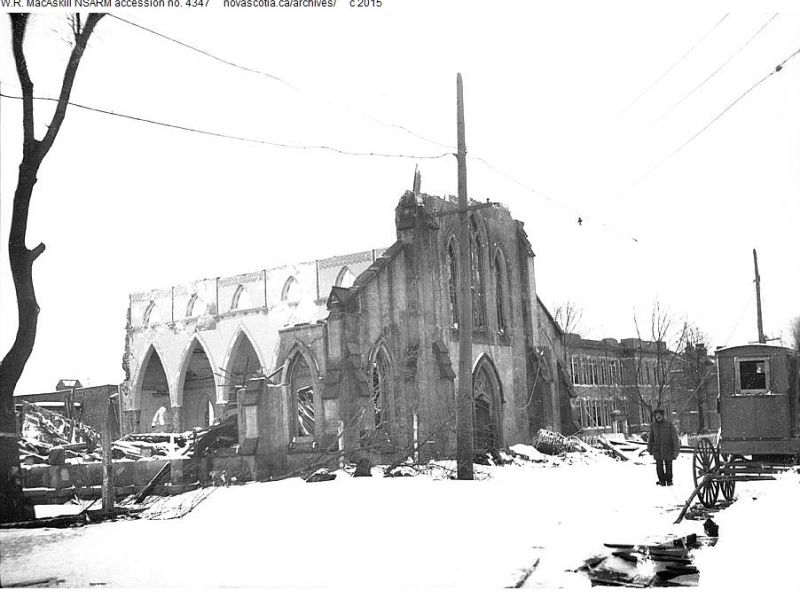
A Look Back 100 Years
 On the morning of Dec. 6, 1917, the outgoing Norwegian relief vessel Imo collided with the incoming munitions vessel the Mont-Blanc in the Halifax harbour. The Mont-Blanc, with its cargo of benzol, picric acid, TNT and gun cotton, caught fire. After burning for 20 minutes, the volatile cargo exploded, causing a blast unsurpassed in human history until the bombing of Hiroshima in 1945.
On the morning of Dec. 6, 1917, the outgoing Norwegian relief vessel Imo collided with the incoming munitions vessel the Mont-Blanc in the Halifax harbour. The Mont-Blanc, with its cargo of benzol, picric acid, TNT and gun cotton, caught fire. After burning for 20 minutes, the volatile cargo exploded, causing a blast unsurpassed in human history until the bombing of Hiroshima in 1945.
Halifax was devastated. Approximately 2000 people were killed in the explosion or died shortly thereafter from their injuries. About 9000 people sustained injuries. Partial or total loss of sight was widespread, as the windows to which people had been drawn to watch the fire blew inward, sending shards of glass into faces and eyes. The records of St. Joseph’s Orphanage show a sharp increase in admissions and hundreds of children were left completely orphaned or with only one living parent. Many Archdiocesan properties were affected, including St. Joseph’s Church, which was destroyed. St. Mary’s Cathedral, further away from the explosion, fared better, though a bell was cracked and the stained glass windows shattered.
As we mark the 100th Anniversary of the Explosion, we present a few items of interest, drawn from the Archival holdings of the Archdiocese of Halifax-Yarmouth, and other sources.
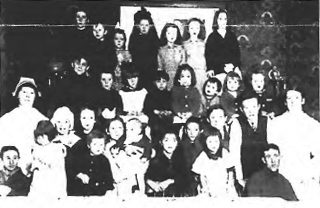 |
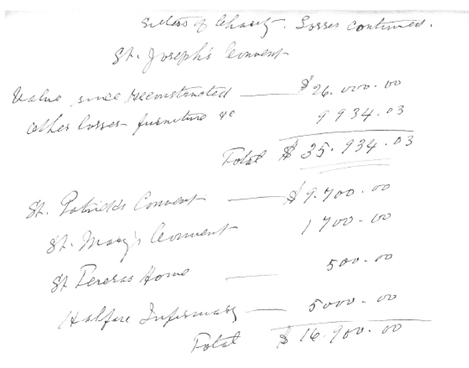 |
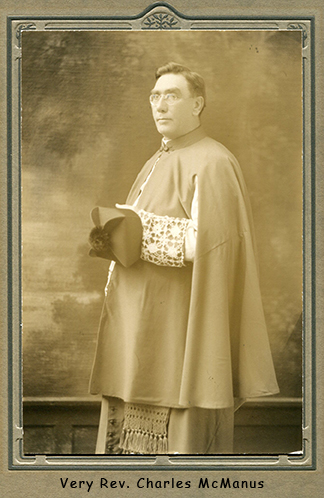 |
|||
|
Knights of Columbus Halifax Council 1097 and Dec 6, 1917 Explosion (pdf) Knight Ervin John Doak was kind enough to share some of the results of his research into the involvement of the Knights of Columbus in recovery efforts following with the explosion. Many thanks to Mr. Doak! |
†McCarthy-Damages list (pdf) This list, in Archbishop McCarthy’s handwriting, shows the estimated dollar value of the damage to Archdiocesan properties. According to an online inflation calculator (in Canadian dollars) $1000 in 1917 would equal roughly $15,700 today. The damages in 1917 totalled over $2,300,000. That amount would total over $36,134,939.76 today. |
Sermon (pdf) What follows is the homily preached at the funeral of Msgr. Charles McManus, at St. Mary’s Cathedral on January 18, 1940 by Rev. Dr. Charles Curran. Rector of St. Mary’s Cathedral when he died, Fr. McManus had been the pastor of St. Joseph’s Church on the day of the Halifax Explosion. He worked tirelessly to minister to the dying and injured in the immediate wake of the explosion, and to his devastated congregation in the weeks, and months that followed. This homily speaks of that experience. |
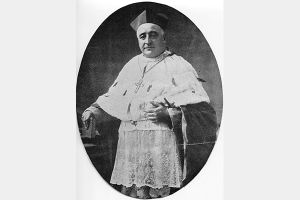
Halifax, Feb 7th, 1918
Edward, by the Grace of God and favor of the
Apostolic See, Archbishop of Halifax:
To the Clergy, Religious Orders and Laity of the
Archdiocese:health and Benediction in the Lord
Dearly Beloved:
Amid the calamities which of late have befallen our people there has been little need or occasion for words. Ruin tells its own story, desolation has left its visible record. Sorrow has come upon us, to be felt and shared but not to be described. The suffering of each is the suffering of all, and the general affliction has become a personal grief. In time of rejoicing we may go on our separate ways; but now we tread the same path; adversity brings us together.
The summons has been to action, with the single purpose of helping as we might to lift the burden for others and for ourselves. And the summons has been heeded. As we survey the dreadful events from whose shadow we are slowly emerging, our thought returns again and again to this central conspicuous fact; we, as a people, are one. Our aims are identical; our duties more clearly defined than ever, and the bond of our unity stronger. Disaster has taught us that prosperity never could teach. The shudder that it sent through our souls stirred the pulse and the power of our common humanity. A new spirit sprang up within us, begotten of the anguish of our hearts, bursting into life from the agony of death. A depth and a breadth of sympathy till then unknown, was revealed, and in that revelation we knew one another as never before. Henceforth our striving is for the welfare of all, our rivalry for the attainment of what is noblest and best.
Long years of the toil and turmoil of war had made us familiar with hardship. In countless ways we had learned the meaning of sacrifice. The bravest of our sons and brothers had given themselves freely for their country’s cause. We mourned them, and yet we took comfort in thinking of their loyalty, of their triumph over self and private desire. We knew for a certainty that heroism such as theirs could not fail of its reward, in heaven or on earth. And while they have passed from struggle to everlasting peace, we are the heirs of their splendid example.
The spirit of duty that led them to battle did not perish when they fell. It lives on in every Canadian heart, in every home of our beloved Nova Scotia. Our people had responded to the call of the nation’s need in distant lands, and so when sudden destruction blighted our principal city they set themselves instantly upon the work of relief. With an energy and determination that nothing could daunt, they took up the task of restoring, of creating anew from the wreck of their former achievement. The magnitude of their misfortune was equalled and surpassed by the greatness of their courage and the calm of their patient endeavour.
At times the spirit of duty is stern; but when it arises in behalf of those who are helpless, its bidding is tender and its burden is easy to bear. So it happened here. Men who were stricken to the soul by their own immediate losses, had open eyes and willing hands to care for the wants of others. Women whose hearts were torn by sorrow became strong and quick in their gentle ministration. Self was forgotten in mutual pity, and fellowship was hallowed with a new consecration.
For a moment it seemed that we would have to depend on our own slender and broken resources; but soon we realized that we were not alone. From beyond the borders of our province and country came words of sympathy, and with words came generous deeds. No appeal was required; the fact of our great distress was sufficient to rouse our magnanimous neighbors. The alliance of humanity triumphed, and the covenant of good-will was strengthened a hundredfold. Thus a new and most welcome duty was laid upon us. We gladly acknowledge our debt of gratitude; we are thankful not only for the aid so readily given, but also for the evidence it affords of true international friendship.
Such evidence is the more assuring in view of the conflict which is waging beyond the sea. For if the horrors of war have been intensified to the point of shaking our belief in all that made for peace and mutual confidence among men, we turn on the other hand to our own experience and therein we find proof that the better elements, the nobler promptings of our nature, survive. We see that if skill and resource can be used to destroy, they can serve none the less to save and relieve. Selfishness no doubt has scored its victories, but these have only betrayed its real baseness and emphasized the truth that life and happiness depend upon the observance of the first and greatest commandment.
Thus, through affliction at home and warfare of hatred abroad, a gleam of hope is shining. We have come indeed to understand how frail a thing our existence is, how uncertain our tenure of earthly possession. And yet withal the value of life, its sacredness and spiritual beauty, are now more clearly perceived. What sustains us now, what will guide and strengthen us in our onward course, is not any material advantage, nor wealth, nor power, nor worldly wisdom. The soul within us that God has fashioned and endowed, no craft or violence can ever destroy. The things of earth, even our bodily frame and habitation, sooner or later, return to the primal dust; it is their bourne and destiny. But the spirit, God’s own creation, has in Him alone its perfect fulfilment. This is the real and final explanation of our present condition. The evils that befall mankind through the malace and cruelty of man are due to the fact that God is forgotten and His laws defied. Hence the ruthless violation of the rights which He had given; hence, too, the contempt fur life itself. These surely are bitter lessons; but their very bitterness goes to show, with a power that no other argument could exert, what the world must come to when it sets up its errors instead of God’s truth and its scheme of temporal gain in place of His eternal design.
Grievously as we have suffered from the havoc of natural forces, we have not been deprived of our moral vision. We have not been driven to think or to act as though the struggle for existence which rules the animal world were the sovereign law in our human relations. We hold to our principles of justice and respect for personal freedom. We are more than ever convinced that without mercy and charity there is no genuine civilization.
What we marvel at most is the fact that intelligent men should have needed to learn the simplest of moral truths by the cruel instruction of war. The gospel of Christ is so plain and the lessons of history so easy to read, that any one might have seen and understood the things that make for the peace of mankind. It may be that these have been hidden from the world by passion and greed. It may be that in seeking after riches and pleasure men were blinded to the danger that threatened the very foundations of social existence. But, however we explain the perversion that has brought about the conflict, we may be sure that the illusion is passing. Men are facing the light once more. They cannot turn aside from the issue nor take up a neutral position. They must see, whether it please them or not, that only two courses are open; either return to the pathway of life in the footsteps of Christ, or go on to final extinction: there is no other possible course.
For us as Christians the choice is already made. But let us not forget that we owe a duty even to those who still are groping in the darkness of doubt or finding their way with slow hesitation. If the world is to be won back to Christ, mere theories will not serve the purpose. Only actual concrete examples of Christian living will lead men to earnest conviction and with that to sincere imitation. Let them realize that the battle worth fighting is against the tendencies to evil within them, that the greatest of conquests is that which over-comes self. Let them take this to heart; and then let them see that men and women no stronger nor wiser than they have actually fought and have conquered. They will soon discover the method of combat, the nature of spiritual strength and its sources.
“This is the victory that overcometh the world, our faith” — abiding faith in God and His goodness, though perchance for a time we discern not His purpose; and likewise faith in our fellowmen, even though many be found untrue or unworthy. Through faith like this comes victory, not with bloodshed or strife but with inward control and quiet restraint, with charity that “beareth all things, believeth all things, hopeth all things, endureth all things.’’
With this victorious faith you enter the season of prayer, drawing nearer each day to the solemn memorial of the world’s redemption. Pray, therefore, Almighty God whose never-failing providence ordereth all things both in heaven and earth, that He keep us ever faithful in His service, defending us in all dangers and adversities and enabling us with His grace to walk steadfastly upon the way that leadeth to eternal life, through the loving atonement of Christ Jesus, our Saviour.
This Pastoral Letter shall be read in every Church of the Diocese on the first Sunday after its reception that the Pastor shall officiate therein.
(signed) †Edward McCarthy
Abp. Halifax
Rev. C. P. Curren,
Pro Sec.
Archives Contact
Sharon Riel
Archivist - Halifax Office
Archdiocese of Halifax - Yarmouth
(902) 429-9800 ext 314

















